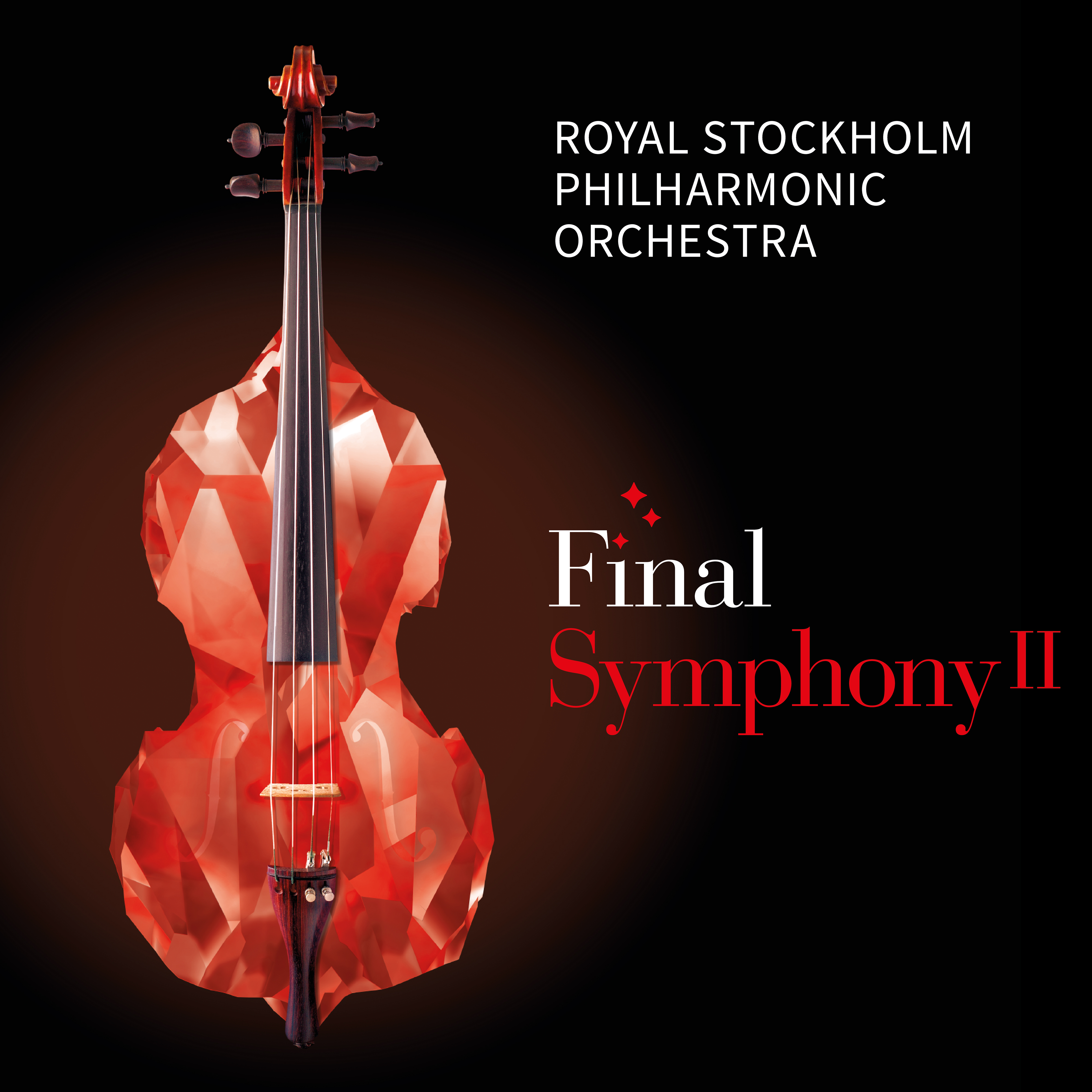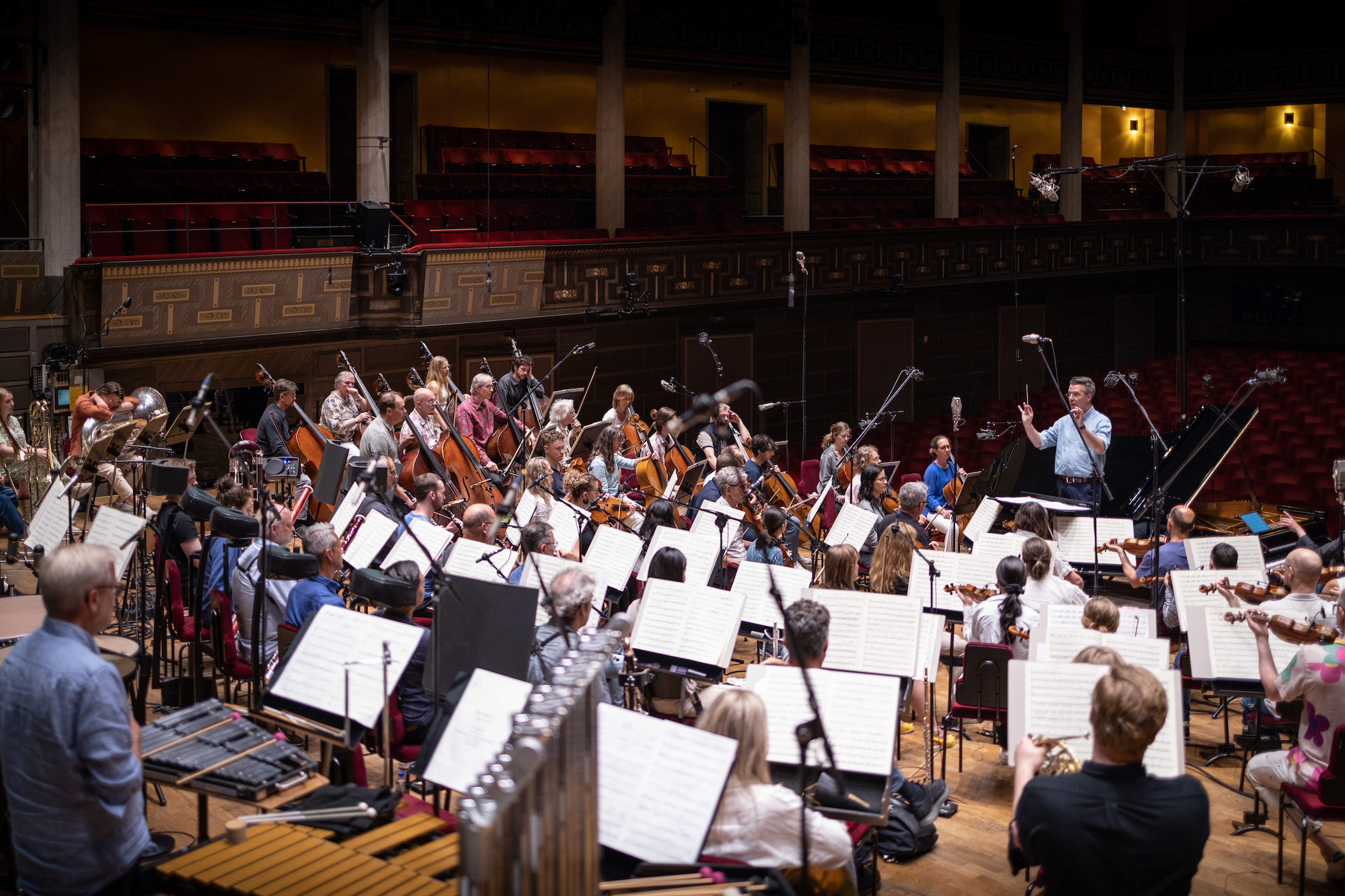Final Symphony II – music from Final Fantasy V, VIII, IX and XIII
 |
Album Title: Final Symphony II – music from Final Fantasy V, VIII, IX and XIII |
| Record Label: Merregnon Records |
|
| Catalog No.: N/A |
|
| Release Date: August 4, 2023 |
|
| Purchase: Buy at Bandcamp |
Overview
Final Symphony II – music from Final Fantasy V, VIII, IX, and XIII is the latest album release from Thomas Böcker’s Merregnon Records, featuring orchestral arrangements performed by the Royal Stockholm Philharmonic Orchestra under conductor Andreas Hanson. The album is a follow-up to Final Symphony, with a similar focus on longer orchestral suites arranged by the same team of Jonne Valtonen, Roger Wanamo, and Masashi Hamauzu. The recording comes nearly eight years after the pieces were originally performed in concert in 2015. Even so many years later, Merregnon remains the only team producing these types of orchestral works for video game music, telling musical narratives through developments and interactions of the leitmotifs and themes while drawing on techniques from classical music. These works can thus be challenging, but they are also more rewarding for attentive listeners, although Final Symphony II makes clear efforts to be more accessible than its more ambitious predecessor.
Body
As with their previous projects, Final Symphony II begins with a short original work written by Jonne Valtonen to preface the programme, this one being titled “Fanfare (In a Roundabout Way)”. Here Valtonen chooses simpler melodic motifs to build upon, and texturally the piece is varied and vibrant, seemingly giving a taster of the textures to come in the later suites. He appropriately fits in a short reference to his first Final Symphony fanfare as well as the classic Final Fantasy “Prelude”, making for a nice rousing opening to the proceedings.
The album then moves onto its first suite, dedicated to Final Fantasy XIII, “Utopia in the Sky”. It is arranged by its original composer Masashi Hamauzu, with orchestration and partial arrangement by Jonne Valtonen. Hamauzu was reportedly unhappy with previous orchestrations, and so used this opportunity to better realize his vision rather than construct a wholly new work. This suite thus comes closest to a traditional medley, and as its title suggests the suite focuses more on the brighter aspects of the original soundtrack, with significant segments devoted to the “Prelude”, “Nautilus”, and the themes for Lightning, Vanille, and Fang. It is a bit disappointing that the suite doesn’t bring much new in terms of reharmonizations or interacting themes, but it is still carried by the strength of its source material, which stands out harmonically and texturally from the other suites which are instead based on Nobuo Uematsu’s work. At times the new orchestrations really make a difference, as in the slower and more lyrical approach to both “Nautilus” and “Lightning’s Theme”, or in the lush orchestration of “Vanille’s Theme”. I’m also particularly pleased at the decision to dip into the Lightning Returns soundtrack for the opening and for “The Song of the Savior – Grand Finale”, which slots in quite naturally beside “Fang’s Theme”. Although the suite has the least novelty and is more modest, it is still a very enjoyable collection of many of the highlights of the already exceptional Final Fantasy XIII soundtrack.
The second suite is the piano concerto for Final Fantasy IX, titled “For the People of Gaia”, with Roger Wanamo providing the arrangement for Nobuo Uematsu’s original compositions. Although it is a continuous work, the concerto has four distinct movements centred on Zidane, Vivi, Garnet, and the battle with Kuja respectively. The first movement is the weakest to me, mainly because “Zidane’s Theme” does not rank among Uematsu’s better compositions, though the classically-influenced arrangement for piano and orchestra makes it an improvement over the original. Wanamo keeps things spritely and light, even as he transitions to “Festival of the Hunt”. The playful movement dedicated to “Vivi’s Theme” fares better thanks to playful rubato and better communication between the piano and the orchestra, replete with the stylings of a Prokofiev gavotte. The slow movement for Garnet focusing on “Melodies of Life” is beautiful and moving, and Wanamo draws again from Chopin-esque piano undercurrents to add colour and tension to Uematsu’s plainer harmony. But the highlight is the stunning final movement, which is explosive with energy and where Wanamo takes the most liberty with the themes. I was especially impressed with the Rachmaninov-styled cadenza and the way Wanamo makes a whirlwind out of the “Final Battle” motif. It’s a wonderful translation of the original synth into an orchestral idiom that gives it a brand-new feel and plenty of character. Soloist Mischa Cheung is up to the task throughout, providing power and tenderness as needed, easily navigating the different stylistic demands. Overall it is a solid concerto that gets better as it goes, which is impressive given my ambivalence to the source material.

© Nadja Sjöström
The following suite is another arrangement by Wanamo, this time for Nobuo Uematsu’s Final Fantasy VIII soundtrack. This suite was previously featured on Symphonic Memories, although it originated as part of the Final Symphony II programme. The suite is titled “Mono no Aware”, a Japanese phrase referring to the impermanence of things; perhaps a surprising title given that it isn’t an obvious theme from the game to me, but I’ve come to appreciate the way it shapes this suite, which oscillates between quieter atmospheres and heavy action sequences frequently. The suite is not a summary of the game’s narrative, even as it recreates scenes such as “Waltz for the Moon” and “The Landing”, but rather it is about the development of motifs from “Liberi Fatali”, “The Oath”, “Ami”, “Succession of Witches”, and “Eyes on Me”, which are interacting with each other throughout the entire piece in a manner that seeks to capture the idea of “Mono no Aware”. The early uneasy entanglement of these themes leads to a wonderful cathartic resolution at the end with a particularly emotional reharmonization of “The Oath” in a major key. Wanamo makes great usage of solo instruments throughout, which provides both dynamic variety as well as spotlight for the progress of these motifs. It is perhaps the most emotional of the suites on the album.
The suite for Uematsu’s score for Final Fantasy V, titled “Library of the Ancients” and arranged by Jonne Valtonen, is the bombastic finale to the programme, with a considerably heavier feel than with the other arrangements. The suite begins with the surprising choice of “Musica Machina”, featuring the driving rhythm that serves as the refrain of the suite, and which also quickly establishes the heavier tone that continues throughout with thick strings and heavy brass. Valtonen also adds much needed counter-melodies to tracks like “The Evil Lord Exdeath” to fill them out a bit, and in doing so also brings out lesser-known tracks from the game like “Sealed Away” and “Spreading Grand Wings”. An easy highlight is “Reina’s Theme” with beautiful delicate moments contrasting with palpable tension in the harmony to reflect the state of the world of the game. As with the concerto for IX, there is a simplified narrative that roughly summarizes the game, and the drive of the piece is the transformation of the “Main Theme of Final Fantasy V” towards a triumphant resolution. I’ve always felt that the melody for this theme was intriguing but a bit too vague, but Valtonen takes it on a journey to give it an emotional resonance that I never thought possible. The original soundtrack is still one of Uematsu’s lesser works and many of the songs featured would not have stood well on their own, but Valtonen does a great job in bringing them together into a potent whole, yet perhaps more attentiveness is required here to appreciate what has been done than in the other suites.
Aside from the main suites, the album also captures the three encores from the concert. The first actually follows right after the Final Fantasy IX concerto, and is a piano solo arrangement by Wanamo for “Not Alone” from the same game. The arrangement has plenty of flourishes and complexity, and I appreciate that the performance still feels restrained, shying away from a melodrama that would have been inappropriate for the piece. The next encore comes at end of the concert, and brings in the signature comedic antics of the Merregnon team. Valtonen’s arrangement begins with a straightforward rendition of “Battle at the Big Bridge” with added layers of the theme’s melodies for more power. The piece then abruptly falls apart for a tuba solo (portrayed as a mishap during the live performances), which then rebuilds as the series’ “Chocobo Theme”. Valtonen then skillfully brings the two themes together in an audacious and exciting fusion, which is quite a feat given how different the two original themes are. The final encore is for the classic “Main Theme” of Final Fantasy. Wanamo here opts for a straightforward arrangement to close out the programme, and I appreciate the softer approach in the early parts of the arrangement. It is a safe but nevertheless satisfying way to end the concert and album.
Summary
Final Symphony II is another resounding success, contributing to a cross-section of video game music and classical music that is still begging to be further explored. Although the arrangements are a tad more accessible in that there is less adventurous development of themes than in the first Final Symphony, there is still great sophistication at work here that will provide a rewarding challenge for listeners. The programme has a great balance of heavier and lighter suites, and the team really elevates some of the lesser-known tracks that otherwise would not have functioned well in an orchestra setting. The recording and performance is of the high quality that we’ve come to expect from the team, with great clarity for the soloists. The album was well worth the wait for those of us unable to attend the concerts in person, I’m sure it will also be well worth the wait for whatever Merregnon has planned next.
Do you agree with the review and score? Let us know in the comments below!
4.5
Posted on August 4, 2023 by Tien Hoang. Last modified on August 4, 2023.















I’m glad to see this site isn’t completely inactive. Thank you for another excellent review that dissects video game music and articulates certain strengths and weaknesses as it’s presented in new forms.
Thank you for your encouraging response! We might have a few more posts lined up for the coming weeks.